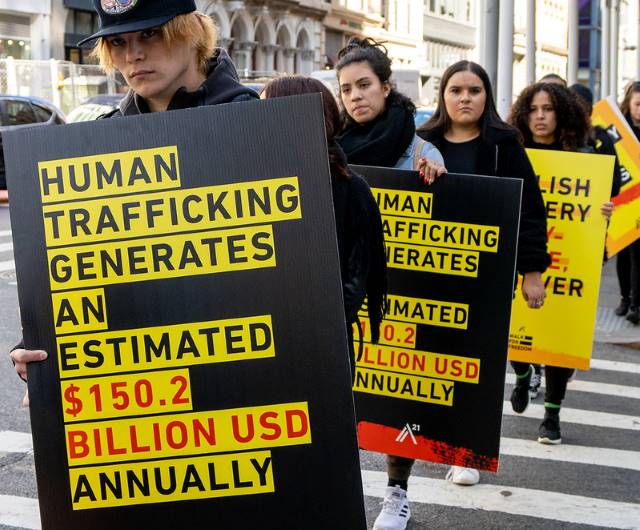Efforts to Eliminate Human Trafficking in Poland
 The Republic of Poland, located within central Europe, is one of the many European countries that human trafficking has affected. Human trafficking is a complex global issue that is extremely difficult to eliminate as it is often invisible and difficult for authorities to track. In Poland, children and women are common targets for traffickers. Victims often come from low-income areas and have little legal protection, making it easier for traffickers to transport victims to and from Poland. In order to eliminate human trafficking in Poland, the country must address underlying issues, such as poverty.
The Republic of Poland, located within central Europe, is one of the many European countries that human trafficking has affected. Human trafficking is a complex global issue that is extremely difficult to eliminate as it is often invisible and difficult for authorities to track. In Poland, children and women are common targets for traffickers. Victims often come from low-income areas and have little legal protection, making it easier for traffickers to transport victims to and from Poland. In order to eliminate human trafficking in Poland, the country must address underlying issues, such as poverty.
Underlying Problems
Women and children are the most common victims of human trafficking globally. Approximately 70% of trafficking victims are women and 50% of trafficking victims are children. Additionally, estimates have stated that traffickers traffick 84% of victims globally for the purpose of sexually exploiting them. Sexual exploitation is also the most common form of human trafficking in Poland. Trafficking victims may have limited education, may not be aware of signs of trafficking and may be in positions where they are desperate to help their families monetarily. As a result, they may be vulnerable to traffickers.
Poverty has a significant connection to trafficking. As of 2020, approximately 5% of Polish citizens were living in a state of extreme poverty. Individuals and families who live in extreme poverty are the most susceptible to becoming victims of human trafficking in Poland. They are often desperate for additional sources of income and traffickers often take advantage of this desperation. Traffickers frequently make false promises in order to lure in these vulnerable groups, such as saying they have a place of work for them that pays a substantial amount of money.
COVID-19’s Influence on Human Trafficking
Economic disparities due to the COVID-19 pandemic have significantly impacted Poland. The Polish unemployment rate average was approximately 6% from 2020 to 2021, reflecting a large increase from Poland’s average unemployment rate of 3.2% prior to the COVID-19 pandemic in 2019. Due to the fact that human trafficking is invisible and underreported, the exact numbers of global victims are difficult to determine. However, estimates have indicated that there are 109,216 trafficking victims globally. The COVID-19 pandemic may have influenced underreporting due to a lack of access to resources to inform the reports.
Additionally, the economic desperation of the COVID-19 pandemic has indirectly influenced an increase in the dangers of human trafficking. Traffickers are more likely to put their victims in more dangerous and violent situations so they can make a profit. Additionally, the fact that lockdowns have confined families to the home has made it difficult for people to notice and report potential cases of abuse and trafficking. As a result, victims are more vulnerable than before as lockdowns have made it easier for traffickers to veil their already hidden crimes.
Poland’s Efforts to Reduce Human Trafficking
The Polish government has actively taken measures to reduce human trafficking in Poland in recent years. This has involved passing laws that criminalize human trafficking as well as implementing various strategies that act against trafficking. Examples of such strategies include applying more effort to identify victims and traffickers and providing more in-depth training to authorities so that they can learn the signs of trafficking. Additionally, the Polish government has implemented national anti-trafficking projects countrywide. These projects aim to educate vulnerable individuals, especially Polish children, on the signs of human trafficking and what to do if they enter a threatening situation.
Non-governmental organizations within Poland have worked toward establishing consulting and intervention centers to help trafficking victims. La Strada Foundation against Trafficking and Slavery and Association Po MOC are two prominent organizations that have carried out the work of Poland’s National Consulting and Intervention Centre for Victims of Trafficking. These organizations have successfully established two shelters for female trafficking victims and intervention assistance for physical, mental and legal matters. Combined, these organizations have helped 630 Polish citizens and 746 foreigners from 2011 to 2017.
The Polish government has actively worked toward ending human trafficking in Poland through the establishment of organizations that help victims, laws that criminalize human trafficking and the implementation of anti-trafficking projects. Through these efforts of shedding awareness on the prevalence of human trafficking, individuals can become more aware of the warning signs and dangers of human trafficking in Poland and across the world.
– Francesca Giuliano
Photo: Flickr
